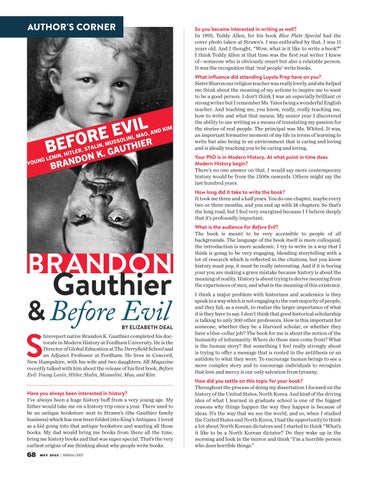AUTHOR'S CORNER
So you became interested in writing as well? In 1995, Teddy Allen, for his book Blue Plate Special had the cover photo taken at Strawn’s. I was enthralled by that. I was 11 years old. And I thought, “Wow, what is it like to write a book?” I think Teddy Allen at that time was the first real writer I knew of—someone who is obviously smart but also a relatable person. It was the recognition that ‘real people’ write books. What influence did attending Loyola Prep have on you? Sister Sharon our religion teacher was really lovely, and she helped me think about the meaning of my actions to inspire me to want to be a good person. I don’t think I was an especially brilliant or strong writer but I remember Ms. Yates being a wonderful English teacher. And teaching me, you know, really, really teaching me, how to write and what that means. My senior year I discovered the ability to use writing as a means of translating my passion for the stories of real people. The principal was Ms. Whited. It was, an important formative moment of my life in terms of learning to write but also being in an environment that is caring and loving and is ideally teaching you to be caring and loving. Your PhD is in Modern History. At what point in time does Modern History begin? There’s no one answer on that. I would say more contemporary history would be from the 1500s onwards. Others might say the last hundred years. How long did it take to write the book? It took me three and a half years. You do one chapter, maybe every two or three months, and you end up with 18 chapters. So that’s the long road, but I feel very energized because I I believe deeply that it’s profoundly important.
BRANDON
Gauthier
& Before Evil
S
BY ELIZABETH DEAL
hreveport native Brandon K. Gauthier completed his doctorate in Modern History at Fordham University. He is the Director of Global Education at The Derryfield School and an Adjunct Professor at Fordham. He lives in Concord, New Hampshire, with his wife and two daughters. SB Magazine recently talked with him about the release of his first book, Before Evil: Young Lenin, Hitler, Stalin, Mussolini, Mao, and Kim. Have you always been interested in history? I’ve always been a huge history buff from a very young age. My father would take me on a history trip once a year. There used to be an antique bookstore next to Strawn’s (the Gauthier family business) which has now been folded into King’s Antiques. I loved as a kid going into that antique bookstore and wanting all those books. My dad would bring me books from there all the time, bring me history books and that was super special. That’s the very earliest origins of me thinking about why people write books.
68
MAY 2022
| SBMAG.NET
What is the audience for Before Evil? The book is meant to be very accessible to people of all backgrounds. The language of the book itself is more colloquial; the introduction is more academic. I try to write in a way that I think is going to be very engaging, blending storytelling with a lot of research which is reflected in the citations, but you know history must pop, it must be really interesting. And if it is boring your you are making a grave mistake because history is about the meaning of reality. History is about trying to derive meaning from the experiences of men, and what is the meaning of this existence. I think a major problem with historians and academics is they speak in a way which is not engaging to the vast majority of people, and they fail, as a result, to realize the larger importance of what it is they have to say. I don’t think that good historical scholarship is talking to only 300 other professors. How is this important for someone, whether they be a Harvard scholar, or whether they have a blue-collar job? The book for me is about the notion of the humanity of inhumanity. Where do these men come from? What is the human story? But something I feel really strongly about is trying to offer a message that is rooted in the antithesis or an antidote to what they were. To encourage human beings to see a more complex story and to encourage individuals to recognize that love and mercy is our only salvation from tyranny. How did you settle on this topic for your book? Throughout the process of doing my dissertation I focused on the history of the United States, North Korea. And kind of the driving idea of what I learned in graduate school is one of the biggest reasons why things happen the way they happen is because of ideas. It’s the way that we see the world, and so, when I studied the United States and North Korea, I had the opportunity to think a lot about North Korean dictators and I started to think “What’s it like to be a North Korean dictator? Do they wake up in the morning and look in the mirror and think “I’m a horrible person who does horrible things.”











